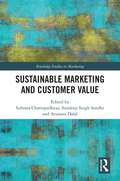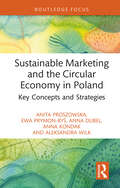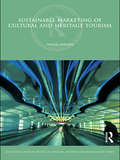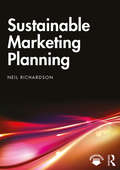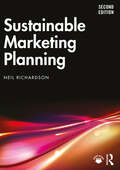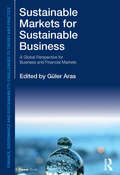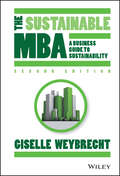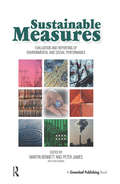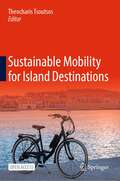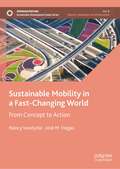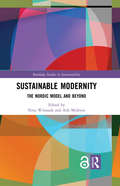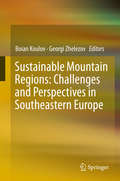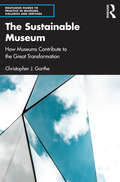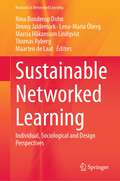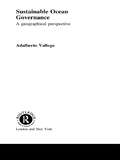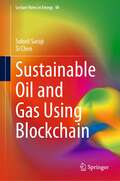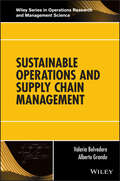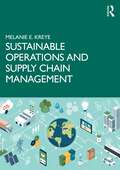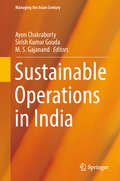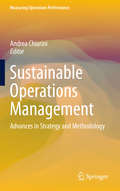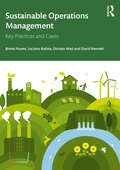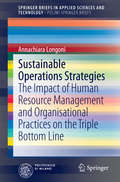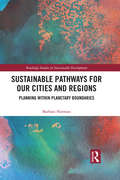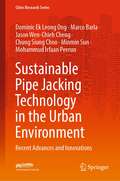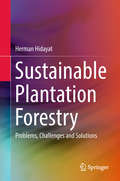- Table View
- List View
Sustainable Marketing and Customer Value (Routledge Studies in Marketing)
by Subrata Chattopadhyay Sundeep Singh Sondhi Arunava DalalAnticipating that marketing will experience a strategic change in the new normal post COVID-19, this book sets out to capture interesting insights from researchers and practitioners through in-depth research on the myriad aspects of industrial transformation. It discusses the facets in which markets can be reached sustainably delivering value to people, planet and create prosperity. Sustainable Marketing and Customer Value establishes an overview and framework for major ideas that connect marketing, consumption and sustainability. It addresses dominant areas of research of sustainability from the marketing perspective, the origin of interest in sustainability, as well as the practice of deprioritising sustainability ideas in pursuit of short-term business goals. Research scholars and business students will find this book of primary relevance, but it is also written for marketing academics and professionals, especially those in large corporations.
Sustainable Marketing and the Circular Economy in Poland: Key Concepts and Strategies (Routledge Focus on Environment and Sustainability)
by Anita Proszowska Ewa Prymon-Ryś Anna Dubel Anna Kondak Aleksandra WilkSustainable Marketing and the Circular Economy in Poland outlines the specific challenges around formulating an organisation's marketing strategy in line with the circular economy (CE) framework.This book helps to solve the problem of ineffective pro-environmental programmes and marketing tools, which are currently used by enterprises to make their activities more sustainable. The authors identify key concepts and strategies of sustainable marketing to highlight the trends and development directions of marketing activities of modern enterprises. Focussing on Poland as a central case study, the book is illustrated with examples of organisations that are implementing sustainable marketing activities that are compatible with the CE model. It also presents the results of studies which examined the pro-environmental marketing efforts of small- and medium-sized enterprises, non-governmental organisations and other actors in Poland. To conclude, the authors put forward recommendations for CE network stakeholders regarding sustainable marketing management, focussing specifically on how to avoid accusations of greenwashing and other unethical organisational behaviour.This book will be of great interest to students and scholars of green marketing, sustainable business and the CE, as well as entrepreneurs and business professionals looking to formulate sustainable marketing strategies.
Sustainable Marketing of Cultural and Heritage Tourism (Routledge Critical Studies in Tourism, Business and Management)
by Deepak ChhabraCultural attractions play an important role in tourism at all levels, and attract huge numbers of tourists interested in heritage and the arts. Cultural Heritage Tourism has positive economic and social impacts but can also have negative impacts on communities and regions. This book draws together and links ideas of tourism from sustainable marketing perspectives and embeds it within a heritage management setting. Through a discussion and analysis of existing literature and practices this book aims to propose a marketing strategy framework grounded in sustainable principles that can be used to sustain and preserve the authenticity of cultural heritage for future generations, whilst appealing to the suppliers, the regulators, and the consumers. The book first explains the dynamics of cultural heritage with its authenticity underpinnings, marketing, and tourism, and proposes a strategic praxis drawn from core sustainable principles. This is followed by a pragmatic examination of the proposed framework from the shaper’s (provider’s) perspective. The material presented in this book is not merely an agglomeration of documented secondary research, but the theoretical concepts are grounded in empirical research and interactive discussions with students and the travel and tourism industry. A variety of heritage institutions across the globe are used as starting points to test the applicability of the proposed paradigm: these include museums, historic house museums, heritage hotels/resorts, festivals, and heritage merchandize. This is a timely offering to a growing and vibrant area of research; what is most pertinent is that it is a thorough and fresh take on the topic with primary research included. It will find a place in student materials for a variety of courses and it should be read by practicing academics and researchers.
Sustainable Marketing Planning
by Neil RichardsonThere are two major parallel challenges facing managers and leaders: first, how to adapt to global changes in markets, competition and supply, and second, how to grow a business while observing recognisably sustainable practices. Companies must now align their values with customers who increasingly seek people-friendly and planet-friendly products and services. Using sustainable marketing techniques to create value ultimately leads to improved customer satisfaction, better professional relationships and increased effectiveness. With marketing planning absent from the current textbook offering, this book provides practical insights, tools and frameworks to help readers produce tactically and strategically appropriate marketing plans. Showing how to embed sustainability in these strategies and reflecting on the historical and current criticisms aimed at marketing, students will be shown how to implement changes while being encouraged to reflect on why they are needed. Full of tools and frameworks to improve comprehension, including chapter-by-chapter learning outcomes, summaries, exercises, applied activities and mini case studies, it bridges the gap between theory and practice effectively and accessibly. Finally, PowerPoint lecture slides and Multiple Choice Questions sections are provided for each chapter as electronic resources. Presenting contemporary themes and challenges at the cutting edge of business research and practice, this book should be core reading for advanced undergraduate and postgraduate students of sustainable marketing, marketing planning and marketing strategy, as well as professionals seeking to improve the competitive advantage of their organisations.
Sustainable Marketing Planning
by Neil RichardsonThis book provides practical insights, tools and frameworks to help readers produce tactically and strategically appropriate marketing plans.Showing how to embed sustainability in these plans, students will be shown how to implement changes while being encouraged to reflect on why they are needed. The text reflects on contemporary themes that impact on sustainable marketing planning, including consumer behaviour, entrepreneurialism, internal marketing, services, international marketing, event management and digital marketing. The second edition has been fully updated with a greater focus on the issues surrounding sustainability, including the environmental challenges facing businesses, sustainable accreditation and integrating the UN SDGs. It provides background on the value discourses that underpin sustainability, incorporates new examples and case studies from broader regions around the world and introduces TBL-based loyalty. Full of tools and frameworks to improve comprehension, including chapter-by-chapter learning outcomes, summaries, exercises, applied activities and mini case studies, it bridges the gap between theory and practice effectively and accessibly.Presenting contemporary themes and challenges at the cutting edge of business research and practice, this book provides core reading for advanced undergraduate and postgraduate students of sustainable marketing, marketing planning and marketing strategy, as well as professionals seeking to improve the competitive advantage of their organisations.Online resources for the use of instructors include PowerPoint lecture slides and a multiple choice questions section.
Sustainable Markets for Sustainable Business: A Global Perspective for Business and Financial Markets (Finance, Governance and Sustainability)
by Güler ArasAround the world the focus is on the relationship between ethics and governance codes and how widely this should be interpreted. Sustainability has three main accepted dimensions: economic growth, social responsibility, and environmental protection. It is a truly multidimensional and multidisciplinary concept, and one which directly affects the risks and opportunities for markets and businesses. In three distinct parts, Sustainable Markets for Sustainable Business explores the relationship between markets and business and sustainable development, as well as issues such as climate change, pollution, land degradation and biodiversity loss. Firstly the authors, all experts from around the world, consider a variety of theoretical issues concerned with sustainability in the new environment. In Part Two the emphasis is on looking at these issues in the market and business practice under various guises. Although every chapter contains discussion and recommended solutions, the final part specifically focuses on future perspectives and the solution strategies for implementation of sustainability measures. Throughout the book the authors address the need for business and market sustainability reforms. The world's markets have the potential to improve the lives of billions in developing countries, reducing poverty and securing environmental quality for future generations. Often they fail to capture the full value of natural resources or promote the interests of poor people. Therefore, an effective public policy framework is required. Sustainable Markets for Sustainable Business and future titles in the Finance, Governance and Sustainability Series address this need.
The Sustainable MBA
by Giselle WeybrechtThe Sustainable MBA provides the knowledge and tools to help you "green" your job and organization, to turn sustainability talk into action for the benefit of your bottom line and society as a whole.Based on more than 100 interviews with experts in business, international organizations, NGOs and universities from around the world, this first of its kind guide brings together all the pieces of the business and sustainability puzzle including:The basics on what sustainability is, why you should be interested, how to get started, and what a sustainable organization looks like.A wide range of tools, guidelines, techniques and concepts that you can use to implement sustainability practices.Tools and tips on how to "green" your job, including how to sell these ideas to your team, how to make green choices as a consumer and how to organize green meetings.A survey of the exciting trends in sustainable business happening around the world.A wealth of links to interesting resources for more information.The Sustainable MBA is organized like a business school course - allowing you easy access to the relevant information you need about sustainability and Accounting, Economics, Entrepreneurship, Ethics, Finance, Marketing, Organizational Behaviour, Operations and Strategy.Giselle Weybrecht's commitment to sustainable development goes back to before her university years. Since then she has expanded her reach to local and national government, business, social entrepreneurs, and the international community. She worked for the United Nations World Water Assessment Programme, is a fellow of the UC Berkeley-based Beahrs Environmental Leadership Programme, and holds an MBA from London Business School. She is currently developing new approaches to raise awareness among managers of how they can incorporate sustainability into their businesses and everyday professional lives.
Sustainable Measures: Evaluation and Reporting of Environmental and Social Performance
by Martin Bennett Peter James Leon KlinkersEnvironmental and social performance measurement and reporting by business has become a high-profile issue during the 1990s. It is increasingly being requested by stakeholders and required by governments. Companies too are finding that they need better environmental and social performance data for effective internal management. And there are a growing number of standardisation initiatives – such as the ISO 14031 guidelines on environmental performance evaluation or the CERES Global Reporting Initiative (GRI) template for sustainability reporting – that are aimed at making it easier for more companies to take action, and for stakeholders to compare their progress.Sustainable Measures collects together most of the key work and individuals concerned with the topic from around the world. Contributions include: environmental and social reporting by John Elkington and colleagues at SustainAbility; the GRI discussion draft; Roger Adams and Martin Houldin on the FEE study of environmental reporting; Janet Ranganathan of the World Resources Institute on sustainability measures; and Martin Bennett and Peter James on ISO 14031 and the future of environmental performance evaluation. There are also chapters examining current practice in Austria, Denmark, India, Indonesia, Japan, the Netherlands and South Africa, developments in electronic reporting, as well as case studies of Baxter, Kunert, Niagara Mohawk, Unox, The Body Shop and the UK water industry, and an analysis of leading social reports.The book is essential reading for all academics, campaigners, policy-makers and practitioners with an interest in issues such as:The standardization and comparability of environmental and social performance measuresMeasuring and reporting on sustainable businessEco-points and other means of evaluating product impactsThe implementation of measurement and reportingBest practice in corporate environmental and social reportingNew means of communicating environmental dataEnvironmental performance evaluation in developing countries
Sustainable Mobility for Island Destinations
by Theocharis TsoutsosThis open access book presents the findings of the CIVITAS DESTINATIONS project regarding the link between mobility and tourism in urban areas and the complications tourist destinations face in becoming more sustainable. It integrates the tourist mobility needs and the associated fluctuation impacts in the design of mobility solutions in order to enforce the accessibility, attractiveness, efficiency and sustainability of transport services and infrastructure for both residents and tourists in island cities such as Rethymno, Crete, and Valetta, Malta. Sustainable Mobility for Island Destinations contains contributions from highly experienced academics, engineers, and planners in the area of sustainable tourism, mobility services, and smart solutions design companies assisting: the change of the mind set in insular and tourism areas; the adoption of green mobility systems and services; andmonitoring the environmental benefits to assist towards the Climate Change. It explores the challenges tourist islands face, such as the seasonal fluxes in transport usage, the pressures of tourism to provide aesthetic green spaces, and the space issues of being an island in relation to economic potential and infrastructure construction. The book suggests areas for future research, and implementation of innovative systems and policies. It will be of interest to academics, planners, decision makers, and environmentalists.
Sustainable Mobility in a Fast-Changing World: From Concept to Action (Sustainable Development Goals Series)
by Nancy Vandycke José M. ViegasOur world is changing fast. Countries’ transport systems, which have long been shaped by project-by-project considerations, must help achieve higher-level goals for the well-being of mankind, as embodied by the UN's Sustainable Development Goals and the Paris Climate Agreement. New forces impose greater effectiveness in the way public choices are made, such as making better use of data and technologies, adopting a more inclusive and participatory approach to decision making, and addressing social concerns about equity. Transport practitioners and country decision-makers have been looking for structured and coherent guidance about ways to adjust to these new dynamics and change the trajectory of transport system. This book examines the rationale for and details an innovative approach for public decision-making to expedite the pace to sustainable mobility.
Sustainable Modernity: The Nordic Model and Beyond (Routledge Studies in Sustainability)
by Nina Witoszek Atle MidttunThe Open Access version of this book, available at https://www.taylorfrancis.com/books/e/9781351765633, has been made available under a Creative Commons Attribution-Non Commercial-No Derivatives 4.0 license. In the 21st century, Norway, Denmark and Sweden remain the icons of fair societies, with high economic productivity and quality of life. But they are also an enigma in a cultural-evolutionary sense: though by no means following the same socio-economic formula, they are all cases of a "non-hubristic", socially sustainable modernity that puzzles outside observers. Using Nordic welfare states as its laboratory, Sustainable Modernity combines evolutionary and socio-cultural perspectives to illuminate the mainsprings of what the authors call the "well-being society". The main contention is that the Nordic uniqueness is not merely the outcome of one particular set of historical institutional or political arrangements, or sheer historical luck; rather, the high welfare creation inherent in the Nordic model has been predicated on a long and durable tradition of social cooperation, which has interacted with global competitive forces. Hence the socially sustainable Nordic modernity should be approached as an integrated and tightly orchestrated ecosystem based on a complex interplay of cooperative and competitive strategies within and across several domains: normative-cultural, socio-political and redistributive. The key question is: Can the Nordic countries uphold the balance of competition and cooperation and reproduce their resilience in the age of globalization, cultural collisions, the digital economy, the fragmentation of the work/life division, and often intrusive EU regulation? With contributors providing insights from the humanities, the social sciences and evolutionary science, this book will be of great interest to students and scholars of political science, sociology, history, institutional economics, Nordic studies and human evolution studies.
Sustainable Mountain Regions: Challenges and Perspectives in Southeastern Europe
by Boian Koulov Georgi ZhelezovCentral to this edited volume is the proposition that the mountainous border region of Southeastern Europe needs to become a special target of European Union scale, regional development policy-making. Vivid case studies from eleven Central and Southeast European states present diverse perspectives on this region's physical geography, economy and demographics and demonstrate the integrative potential of the geographic perspective in mountain research. Europe as a whole has a lot to gain from a "sustainable mountains" policy, especially in Southeast Europe. In their focus on the sustainable development of such areas, the chapters consider regional development policy, ecosystem services assessment, small-scale tourism, and forestry management. This book will be of interest to a wide audience, including academics, students, and practitioners in the fields of geography, ecology, and environmental studies.
The Sustainable Museum: How Museums Contribute to the Great Transformation (Routledge Guides to Practice in Museums, Galleries and Heritage)
by Christopher J. GartheThe Sustainable Museum is the first book to outline a coherent strategy for the direction of museums, as it relates to sustainability in the museum and heritage sector. Arguing that museums must place sustainability at the centre of all their activities, if they are to become key actors with a clear societal role, Garthe considers the issues that museums will likely face as they take on their new roles. Presenting case studies from a wide range of museums around the world, the book considers different ways of implementing sustainability in different types and sizes of institutions. Whilst the book clearly outlines the need for change, it also provides guidance about how to change. Garthe does this by considering specific concepts and approaches to sustainability in relation to the different aspects of museum operations. The book includes a hands-on manual for implementing sustainability management in a museum, whilst also considering the challenges practitioners will encounter and considering what the future of the sustainable museum might look like. The Sustainable Museum will be essential reading for museum and heritage professionals around the globe. The book will also be of interest to academics and students engaged in the study of museums, arts and cultural management, business administration, change management or sustainable development.
Sustainable Networked Learning: Individual, Sociological and Design Perspectives (Research in Networked Learning)
by Nina Bonderup Dohn Jimmy Jaldemark Lena-Maria Öberg Marcia Håkansson Lindqvist Thomas Ryberg Maarten De LaatThis book provides cutting-edge research on networked learning, focusing on issues of sustainability in design for learning, data use, and networked learning connections. It contributes novel theoretical perspectives on networked learning, its role in society and potential for sustainable learning design. It further contributes a set of exemplary empirical cases - exemplary in terms of their innovative learning designs, pedagogical use of technology in connecting learners, and/or critical reflections on implications of utilizing different technologies to support learning. The book is organized into four main sections: 1) Data and datafication, 2) Sustainable learning design, 3) Sociological perspectives on Networked Learning, and 4) Networked learning in times of lockdown. Concluding the book is a final chapter which points to emerging issues within the field of networked learning, based on discussion of perspectives from the chapters The book's focus on the nature of learning and technology-mediated interactions makes it of prime significance to researchers and practitioners in the field of technology-supported teaching and learning.
Sustainable Ocean Governance: A Geographical Perspective (Routledge Advances in Maritime Research)
by Adalberto VallegaThis topical book examines ocean governance and calls for close co-operation between science and policy. Adalberto Vallega uniquely considers the ocean as a spatial complex system which must be represented as a whole and argues that scientific approaches must change to achieve progress and co-operation between science and policy.
Sustainable Oil and Gas Using Blockchain (Lecture Notes in Energy #98)
by Soheil Saraji Si ChenThis monograph explores the potential of blockchain technology to facilitate the transition in the oil and gas (O&G) industry.As the world shifts towards a sustainable energy future, the oil and gas industry faces significant challenges and opportunities. Focusing on the development of a sustainable O&G industry, the book delves into the role of climate and financial markets in the energy sector, applications of blockchain in sustainable energy development, and the challenges of legal and regulatory issues in applying blockchain technology. It provides insight into how the energy industry is already working on reducing carbon emissions and paving the way to a sustainable future with detailed examples of reducing methane emissions, carbon credit markets, sustainable aviation fuels, and plastics. The book also examines how O&G companies could further their sustainability initiatives using blockchain technology for emission data monitoring, carbon capture, utilization, storage, and supply-chain management to develop clean products.
Sustainable Operations and Supply Chain Management
by Alberto Grando Valeria BelvedereSustainable Operations and Supply Chain Management addresses the most relevant topics of operations and supply chain management from the perspective of sustainability. The main focus is to provide a step by step guide for managerial decisions made along the product life-cycle, following a path made up of the following steps: product design, sourcing, manufacturing, packaging and physical distribution, reverses logistics and recovery.
Sustainable Operations and Supply Chain Management
by Melanie E. KreyeThis book takes as its starting point the need to improve sustainability performance across the triple bottom line and reach global sustainable development goals. As such, it places sustainability at the heart of developing and explaining relevant theory, concepts and models in operations and supply chain management. Whereas previous textbooks on operations and supply chain management have focused on augmenting existing models of operations and supply chain management by simply adding on selected sustainability issues, this textbook places sustainability at the heart of operations and supply chain management. Sustainable Operations and Supply Chain Management consolidates the tools, concepts and methods of operations and supply chain management relevant for reaching sustainable development goals. This book includes not only descriptions of the theories and models but also practical cases based on the most recent developments in different industry sectors, including user electronics, healthcare, fashion and energy. Relevant student exercises are also included for use in the classroom or in personal study. This book provides an ideal introduction for Bachelor or Masters-level students, whether they are on general management and business degrees, or are focused on areas such as engineering management, technology management or sustainability management. Furthermore, university-level teachers and lecturers will find the material presented in this book a valuable basis for structuring their courses on operations and supply chain management in the context of sustainability.
Sustainable Operations in India (Managing The Asian Century Ser.)
by Ayon Chakraborty Sirish Kumar Gouda M. S. GajanandThis book focuses on understanding the status quo of sustainable practices in industry operations from an emerging economy perspective, presenting various practices in India. In order to offer a balance between theory and practice, it provides guidelines for applying models to achieve the goal of sustainability in this competitive environment. The chapters include theoretical perspectives, models and empirical evidence on sustainable practices from Indian industries. The book also presents a scholarly perspective on sustainable operations from various researchers and practitioners in India for a global audience in academia and industry.
Sustainable Operations Management
by Andrea ChiariniThis book presents innovative research on various aspects of sustainability in the field of operations management and illustrates the potential of sustainability thinking and practice to improve operations performance and thereby meet customer needs. Particular attention is devoted to corporate social responsibility and marketing strategy, knowledge management for sustainability, the role of culture in a sustainable built environment, sustainable manufacturing through the application of lean and green concepts, advancing sustainability through ISO standards, and the sustainable supply chain. The present decade is proving to be a time of change in terms of business strategies and operations management. Many of the trends are still subject to uncertainty, but an understanding of the need for, and benefits of, sustainability can give a clear indication of their trajectory. Consumers and markets in general believe that while implementing their business strategies, companies should also try to improve society and the environment and to exercise social responsibility toward their employees. This book provides insights into how this may be achieved, and it is recommended for researchers as well as all practitioners and managers dedicated to enhancing sustainability in operations.
Sustainable Operations Management: Key Practices and Cases
by Breno Nunes Luciano Batista Donato Masi David BennettSustainable Operations Management applies the issues of sustainability to all strategic decisions of operations: capacity management, supply network, process technology, and development and organisation. This book extends the existing literature of operations management that for years has been paramount in creating economic value with little consideration of environment and social dimensions. Whilst based on robust theoretical frameworks, some developed by its own authors, the book is enriched by international case studies and real-world illustrations throughout, to demonstrate how this theory translates to practice. Each chapter begins with learning objectives and ends with a summary, activity, and questions for discussion. Readers will gain a comprehensive and in-depth knowledge on how to manage operations for sustainability. They will learn the ways to formulate a sustainable operations strategy and the elements involved in managing tactical and operational activities to enhance sustainability performance over time. The book covers all aspects of the new business sustainability paradigm from an operations perspective, including sustainable development goals, the circular economy and digital transformation. With international agreements and national policies in place around themes such as climate change, ocean plastic pollution, loss of biodiversity, water scarcity, and zero landfill targets, this book will be a must for any university abiding to the Principles of Responsible Management Education (PRIME). The text is suitable mostly for MSc and MBA students on sustainable supply chain and operations management modules as well as broader Operations Management courses, but it can also be used for final-year Undergraduate students as part of advanced operations management modules. Online resources include chapter-by-chapter PowerPoint slides and a test bank of questions.
Sustainable Operations Strategies
by Annachiara LongoniThis book provides detailed guidance on how sustainability, in terms of the triple bottom line, can be developed in operations strategies via human resource management (HRM) and organizational practices such as teamwork, training and employee involvement. The impacts of HRM and organizational practices on environmental and social sustainability, trade-off optimization and the triple bottom line are carefully analyzed, with attention to aspects including organizational responsibility and worker commitment to sustainability. Valuable tips are offered on formulation and implementation of sustainable operations strategies and in addition the alignment of lean manufacturing and the triple bottom line is addressed in a dedicated section. The background to the book and the reason for its topicality, is the difficulty that companies are experiencing in defining and implementing effective sustainability programs that enhance environmental, social and economic sustainability and optimize possible trade-offs. Moreover, although the operations management literature has focused mainly on technical aspects, HRM and organizational practices may also be relevant in enhancing programs' effectiveness and directly impacting sustainability.
Sustainable Pathways for our Cities and Regions: Planning within Planetary Boundaries (Routledge Studies in Sustainable Development)
by Barbara NormanIn an urbanizing world, the majority of people live in urban settlements predominantly on the coastal edge. Focus has historically been on people, place and the challenges and opportunities of living with global change, and academic attention has largely been on sustainability science or sustainable solutions. This book seeks to strengthen the relatively weak link between sustainability science, land use planning and socio-economic change, and show that a more integrated approach to planning will be required to develop more sustainable pathways for cities and regions in the future. Sustainable Pathways for our Cities and Regions builds on the recent publications on cities and climate change, resilient cities and coasts, and sustainable cities, and looks at the ways in which current planning approaches need to be adapted to embrace concepts including green growth, planetary boundaries, healthy cities and longer-term sustainability. Drawing on case studies from four cities selected for their publicly stated commitment to sustainability – Canberra, Kuala Lumpur, Copenhagen and New York – the author proposes seven sustainable pathways and draws conclusions on the positive contribution planning can make in preparing urban and regional communities for significant change in the twenty-first century city. This book will be of great interest to students and scholars of urban planning, sustainable cities, climate change, green growth and community engagement. It will also be of great value to leaders and community activists seeking more sustainable pathways for their cities and regions.
Sustainable Pipe Jacking Technology in the Urban Environment: Recent Advances and Innovations (Cities Research Series)
by Marco Barla Dominic Ek Ong Jason Wen-Chieh Cheng Chung Siung Choo Minmin Sun Mohammud Irfaan PeerunThis book highlights recent advancements and innovations in trenchless technology via the adoption of combined micro-tunnelling and pipe-jacking techniques. This technique is more environmentally friendly, cost effective, less time-consuming and less disruptive compared to conventional open trench excavations for urban construction and urban infrastructure renewal projects. Pipe jacking is a non-destructive technique used in the installation of underground pipelines using a tunnel boring machine (TBM) and thrust forces derived from the hydraulic jack set-up in a deep jacking shaft. It is popular and commonly used worldwide for the installation of sewer and common services cable tunnels as well as for oil and gas pipelines.
Sustainable Plantation Forestry: Problems, Challenges And Solutions
by Herman HidayatThis book discusses sustainable forest management from the perspectives of sociology, anthropology, politics, economics and policy. It examines the roles of governments, private sectors, NGOs, academics and local communities in implementing sustainable plantation forestry, which aims to supply timber for the forestry industry while at the same time reducing global warming. The book also explores the debates on sustainable forest management practices in several countries, and examines the effects of political ecology on plantation forestry as well as the impact of climate change and conservation programs. By analyzing a number of interrelated issues, it offers a valuable resource for all governments, private companies, practitioners, NGOs, academics and students studying forest management and political ecology from a social sciences perspective.
